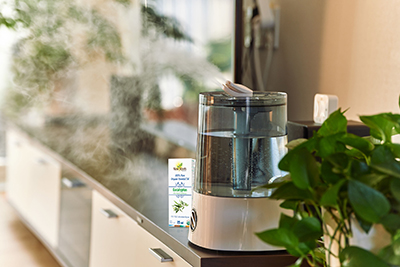Management of Chronic Cough—Naturopathic Perspectives
A cough is one of the most common reasons people visit their doctor. Coughs are annoying, they’re loud and can disrupt sleep for an entire household. With most viral infections, a cough can stick around up to 2 weeks after the infection has cleared. But when a cough lasts longer than 8 weeks, it warrants further investigation.[1]
What Is a Cough?
A cough is an irritation that triggers a pulmonary reflex. The irritant stimulates receptors in the throat or airways. This signals a nerve to send a message to the brain. The brain then contracts all the muscles in the chest and abdomen to forcefully push air out of the lungs (and, hopefully, the irritant too!).[2] The irritant could be a microorganism like a bacteria or virus, dust particle, or simply mucous dripping from the nasal cavity above. Anything that is not supposed to be there will trigger some kind of immune response.
Our immune systems are truly amazing. They can produce excessive mucous to trap foreign bacteria. They can create a forceful sneeze to expel mucous and dust particles that could be potentially dangerous to us. Immune systems raise body temperature to create a difficult environment for microbes to live in. They are highly successful in keeping us alive—but in doing all of this, they can make us feel awful.
Very rarely is a cough just a cough acting alone. Most people who come to the doctor with a cough will have multiple issues going on. The most common reasons for chronic cough include the following.
1. Postnasal Drip (Upper Airway Cough Syndrome)
The term “postnasal drip” only refers to the production of mucous in the nasal cavity that spills over into the oropharyngeal (back of the mouth and throat) and lower airways. This definition does not tell us why the mucous is there in the first place. Chronic rhinitis or nasal inflammation from allergies are usually the most common triggers.[3] Seasonal allergies may create nasal itching for a few months, but environmental allergies can continue year-round. These can include allergens like dust, mold, and pet dander. Doing a skin-prick allergy test can raise awareness as to the allergens to avoid, but of course, progress comes with complete avoidance of these triggers.
 2. Asthma
2. Asthma
Asthma is one of the most common causes of chronic cough among nonsmokers. There are the “classic” and “typical” forms of asthma that present with difficulty breathing, wheezing, and chest pain. In this form, a cough signals the onset of an asthma attack or event. However, there is a whole other category of “cough-variant asthma,” which includes a cough outside of asthmatic events.
It is thought that in individuals with cough-variant asthma, one of the triggers is more consistently present in a smaller quantity.[4] This could be an environmental trigger as mentioned above. This causes airway hyperresponsiveness or slight narrowing of the airways, which means the irritant receptors are poised and ready to signal the cough reflex to the brain. The entire immune system remains on edge, and every little trigger will initiate a cough. It is important to note that this subtype of asthma does not present with a wheeze or difficulty breathing. The cough can present at any time of the day but is most noticeable at night. It is sometimes alleviated with puffers and bronchodilators, but as long as the immune system remains on edge, the cough will persist.[5]
3. Gastroesophageal Reflux Disease (GERD)
GERD on its own can cause a cough. GERD in combination with asthma and/or postnasal drip will drastically increase the intensity of the cough and make treatment a little more challenging. In GERD, there is failure in the signalling of the digestive tract to close the lower esophageal sphincter (doorway to the stomach from the esophagus). Acid from the stomach splashes back into the esophagus and can travel all the way into the mouth. This can present as heartburn or be completely asymptomatic until it reaches the mouth. Acid is corrosive and can damage our tissues, which is why we have a thick layer of mucous around the inside of our stomachs. But when acid travels into the esophagus, we feel the burning because we don’t have that same layer of mucous to protect us. Over time, our bodies will learn to produce mucous in the esophagus, which we can even feel as a lump at the back of the throat. We may feel like we constantly have to clear our throats and our voices may get hoarse or raspy. This excessive mucous can act as an irritant that initiates the cough reflex. Depending on the foods we eat, when we eat them, and how much we eat of them, we may notice this GERD cough all day and all night.
Evaluation of Chronic Cough
As naturopathic doctors, we know that assessment of a health concern involves evaluating the whole person. A chest X-ray will help to eliminate the large worrisome diagnoses, so it is not a bad place to start. This is especially true if the person is a smoker, has a family history of lung disease, or has unexplained and significant weight loss in a short period of time.
Assess Smoking History and Second-Hand Smoke Exposure. This one may seem like a no-brainer, but second-hand smoke exposure can be just as severe in certain individuals. The lungs are able to repair slowly when the exposure is eliminated, but there will always be a little bit of scarring.
 Take Note of All Their Medications. ACE inhibitors are a class of blood-pressure medication that are known to cause a dry cough days or even months after beginning the drugs. Even once the drugs are discontinued, the ACE inhibitor cough can continue up to four weeks later.
Take Note of All Their Medications. ACE inhibitors are a class of blood-pressure medication that are known to cause a dry cough days or even months after beginning the drugs. Even once the drugs are discontinued, the ACE inhibitor cough can continue up to four weeks later.
Ask About Environmental and Workplace Exposures. Many of us spend more time at work than we do at home. Our workplaces can be dusty and moldy, have poor air circulation, or be excessively dry. All these factors can trigger a chronic cough in any individual, especially if you are there for more than five hours of the day. Coal miners, construction workers, and anyone working around fine dust particles is subject to chronic inhalation and at high risk of developing a chronic cough.
Look at What Works and What Doesn’t. If you’ve been taking antihistamines like Reactine and have not noticed a difference, it is unlikely to be an allergic pathway. In this case, asthma and GERD may be more likely. If GERD is suspected, treatment with diet changes and/or reflux medication should eliminate the cough.
How to Manage Chronic Cough
 Dietary Assessment. Changes in diet and elimination of food sensitivities will be the most noticeable with GERD and postnasal drip. Spicy foods are known triggers of acid reflux and should be avoided late at night and in large quantities. Sugar and dairy are among the top mucous-producing agents and can aggravate an already-aggravated immune system. This is especially true during allergy season, when the immune system is already fighting environmental triggers. The addition of sugar and dairy at this time can send the immune system over its threshold and create very obvious allergy symptoms.
Dietary Assessment. Changes in diet and elimination of food sensitivities will be the most noticeable with GERD and postnasal drip. Spicy foods are known triggers of acid reflux and should be avoided late at night and in large quantities. Sugar and dairy are among the top mucous-producing agents and can aggravate an already-aggravated immune system. This is especially true during allergy season, when the immune system is already fighting environmental triggers. The addition of sugar and dairy at this time can send the immune system over its threshold and create very obvious allergy symptoms.
Magnesium Bisglycinate. This is one of my top nutrients for immune and allergic presentations. Magnesium is a very calming micronutrient. It relaxes the airways, lowers a heightened neurological response, and reduces immune overactivity. This is great for both asthma and postnasal drip presentations.
N-Acetylcysteine. Known as a precursor for the powerful antioxidant glutathione, N-acetylcysteine is known to help relax the airways and reduce wheezing. This is especially true for asthma of any kind and can be taken all year round.
 Humidifiers and Essential Oils. A dry house, workplace, or bedroom can be an immediate trigger for a cough. Depending on the ventilation of the building, heating and air conditioning units can take a significant amount of humidity out of the room. If you don’t have a humidifier, try hanging a wet towel around your bedroom. If the towel is perfectly dry when you wake in the morning, you know you need to add more humidity. Boil a pot of water on the stove and leave it on a coaster by your bedside. Add 1–2 drops of eucalyptus or lavender into the steaming water for added benefit.
Humidifiers and Essential Oils. A dry house, workplace, or bedroom can be an immediate trigger for a cough. Depending on the ventilation of the building, heating and air conditioning units can take a significant amount of humidity out of the room. If you don’t have a humidifier, try hanging a wet towel around your bedroom. If the towel is perfectly dry when you wake in the morning, you know you need to add more humidity. Boil a pot of water on the stove and leave it on a coaster by your bedside. Add 1–2 drops of eucalyptus or lavender into the steaming water for added benefit.
Chronic coughs can have a significant impact on your activities of daily living. They can interrupt your sleep, your exercise, and even your productivity at work. A thorough investigation of the whole body can help identify the source and its triggers.
References
- Sivaraman, P., and D. Gianakos. “The 15-minute visit: Chronic cough.” Modern Medicine. April 1 2006.
- Mayo Clinic. Cough. https://www.mayoclinic.org/symptoms/cough/basics/definition/sym-20050846 · 2019-06-21.
- Cunha, J. “Chronic rhinitis and post-nasal drip.” MedicineNet. · https://www.medicinenet.com/chronic_rhinitis/article.htm · Reviewed 2019-09-09.
- Dicpinigaitis, P. “Chronic cough due to asthma.” Chest Journal, Vol. 129, No. 1 (2006): 75S–79S.
- Niimi, A. “Cough and asthma.” Current respiratory medicine reviews, Vol. 7, No. 1 (2011): 47–54.

 Stores
Stores